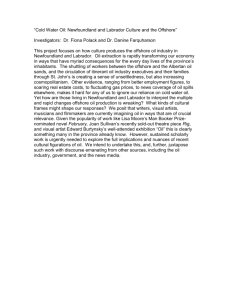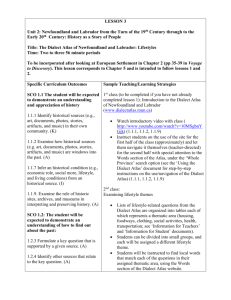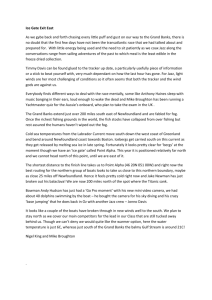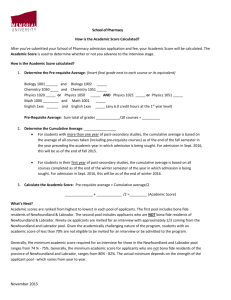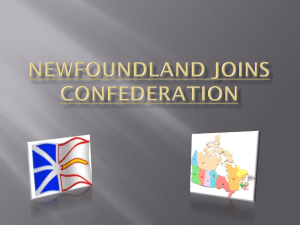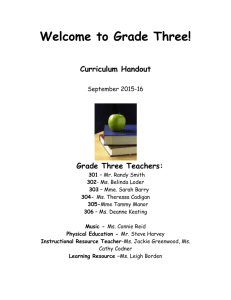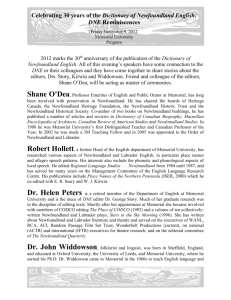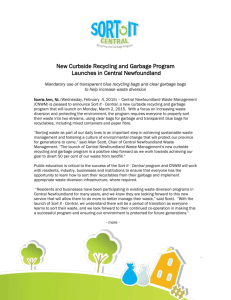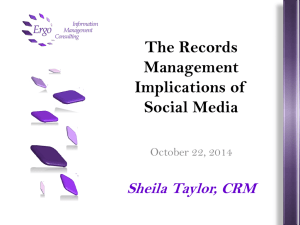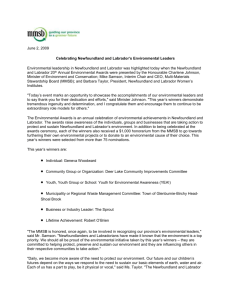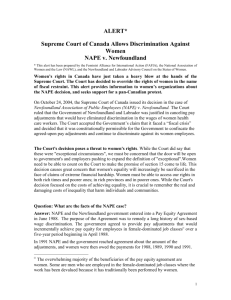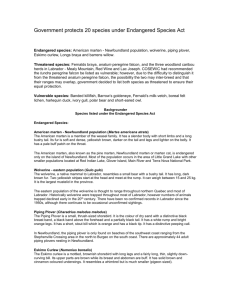Celebrating 30 years of the Dictionary of Newfoundland English:
advertisement
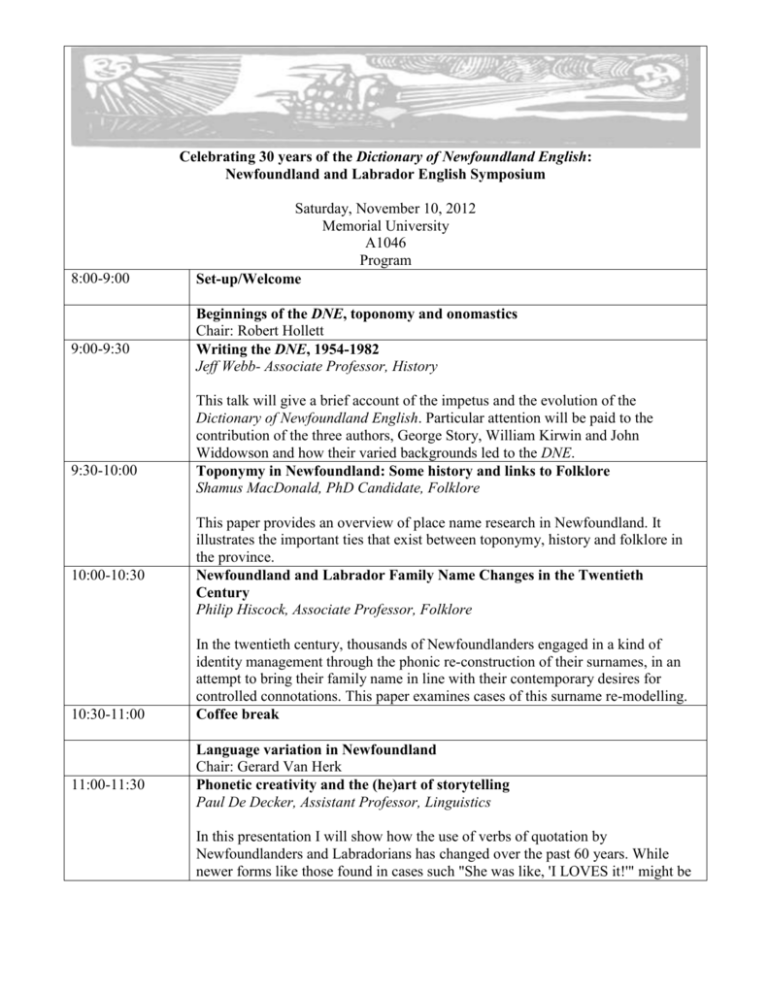
Celebrating 30 years of the Dictionary of Newfoundland English: Newfoundland and Labrador English Symposium 8:00-9:00 9:00-9:30 9:30-10:00 10:00-10:30 10:30-11:00 11:00-11:30 Saturday, November 10, 2012 Memorial University A1046 Program Set-up/Welcome Beginnings of the DNE, toponomy and onomastics Chair: Robert Hollett Writing the DNE, 1954-1982 Jeff Webb- Associate Professor, History This talk will give a brief account of the impetus and the evolution of the Dictionary of Newfoundland English. Particular attention will be paid to the contribution of the three authors, George Story, William Kirwin and John Widdowson and how their varied backgrounds led to the DNE. Toponymy in Newfoundland: Some history and links to Folklore Shamus MacDonald, PhD Candidate, Folklore This paper provides an overview of place name research in Newfoundland. It illustrates the important ties that exist between toponymy, history and folklore in the province. Newfoundland and Labrador Family Name Changes in the Twentieth Century Philip Hiscock, Associate Professor, Folklore In the twentieth century, thousands of Newfoundlanders engaged in a kind of identity management through the phonic re-construction of their surnames, in an attempt to bring their family name in line with their contemporary desires for controlled connotations. This paper examines cases of this surname re-modelling. Coffee break Language variation in Newfoundland Chair: Gerard Van Herk Phonetic creativity and the (he)art of storytelling Paul De Decker, Assistant Professor, Linguistics In this presentation I will show how the use of verbs of quotation by Newfoundlanders and Labradorians has changed over the past 60 years. While newer forms like those found in cases such "She was like, 'I LOVES it!'" might be 11:30-12:00 12:00-12:30 12:30-2:00 2:00-2:30 2:30-3:00 seen as leading to the loss of a distinctive Newfoundland dialect, I argue that these verbs enable young Newfoundlanders to create dynamic stories, employing traditional dialect features in creative and unique ways - pronunciations they might not otherwise use in their day to day speech. Stop and go (away): Linguistic consequences of non-local aspirations among small-town Newfoundland youth Sarah Knee, PhD Candidate, Linguistics This study investigates the role of local affiliation and social aspiration by examining the production of ‘th’ sounds among twelve adolescents in New-WesValley. Informants share social characteristics and community, but differ in sex and aspiration: some intend to remain in the community, while others plan to leave at the earliest opportunity. We found that youth with local aspirations were significantly more likely to produce ‘th’ as ‘t’ or ‘d’ than youth with non-local aspirations. Mapping regional diversity: Introducing the Online Dialect Atlas of Newfoundland and Labrador English Sandra Clarke, Professor Emerita, University Research Professor, Linguistics To date, there has been no thorough investigation of regional language variation throughout the province. This talk introduces the Dialect Atlas of Newfoundland and Labrador, designed to fill this gap. The atlas is grounded in data assembled by linguist Harold Paddock in the 1970s and 1980s, and represents the speech of over 200 older residents of the province, from 90 different coastal communities. Online and interactive, the atlas is now almost fully completed, under the direction of faculty members affiliated with Memorial University’s English Language Research Centre, in conjunction with DELTS and C & C Webworks. This talk demonstrates the features of the atlas, and shows how patterns of regional variation provide insights into our linguistic and settlement history. Lunch/ELRC tour Fieldwork in Newfoundland and Labrador Chair: Robert Hollett In the field with Dr. John Widdowson Suzanne Power, M. A. Candidate, Linguistics This presentation is a collage of fieldwork stories from DNE editor Dr. John Widdowson. These stories come from an interview recorded at the English Language Research Centre in August 2012 and are accompanied by photographs from the ELRC files dating back to the 1960s. “Our Little Townie”: Observing and performing in Ferryland Rachel Deal, M. A. Candidate, Linguistics Thanks to a local thespian my fieldwork took me to Ferryland, where I observed and partook in their dinner theatre. “Away with ya!” was locally written, produced, and performed. This combination has been ideal for studying cultural identity and authenticity across performance and interview speech. This talk will describe my experience in Ferryland as well as some of my findings. 3:00-3:30 3:30-4:00 4:00-4:30 4:30-5:00 5:00-5:30 English in Labrador Jennifer Thorburn, PhD Candidate Linguistics Although there is a long history of studying English in Newfoundland, there is relatively little work on English in Labrador, even though some scholars consider the continental portion of this province to be “even more of a language museum” than Newfoundland (Orkin 1970:100). In this talk, I provide an overview of research on English in Labrador, beginning with a historical perspective and culminating with my own experiences working in Nain, an Inuit community on Labrador’s north coast. Coffee break Building Identity Chair: Suzanne Power You deal with what she brings: performances of masculinity in Newfoundland offshore workers' narratives Nicholas Hartmann, PhD Candidate, Folklore The traditional notion of manhood in Newfoundland, long connected to the fishery, faced a crisis following the 1992 cod moratorium. The rise of the offshore oil industry brings up important questions regarding the role of the working man in Newfoundland families. This paper examines, via the study of occupational narrative, how tradition is maintained and adapted in the present era. Enregister now! Salience, enregisterment, and Newfoundland English and identity Gerard Van Herk, Associate Professor, Canada Research Chair in Regional Language and Oral Text, Linguistics This paper looks at how the commodification and enregisterment of Newfoundland English – especially through comedy and advertising – leads to some linguistic features becoming more socially important than others, and how that is reflected in the choices speakers make. Closing remarks
